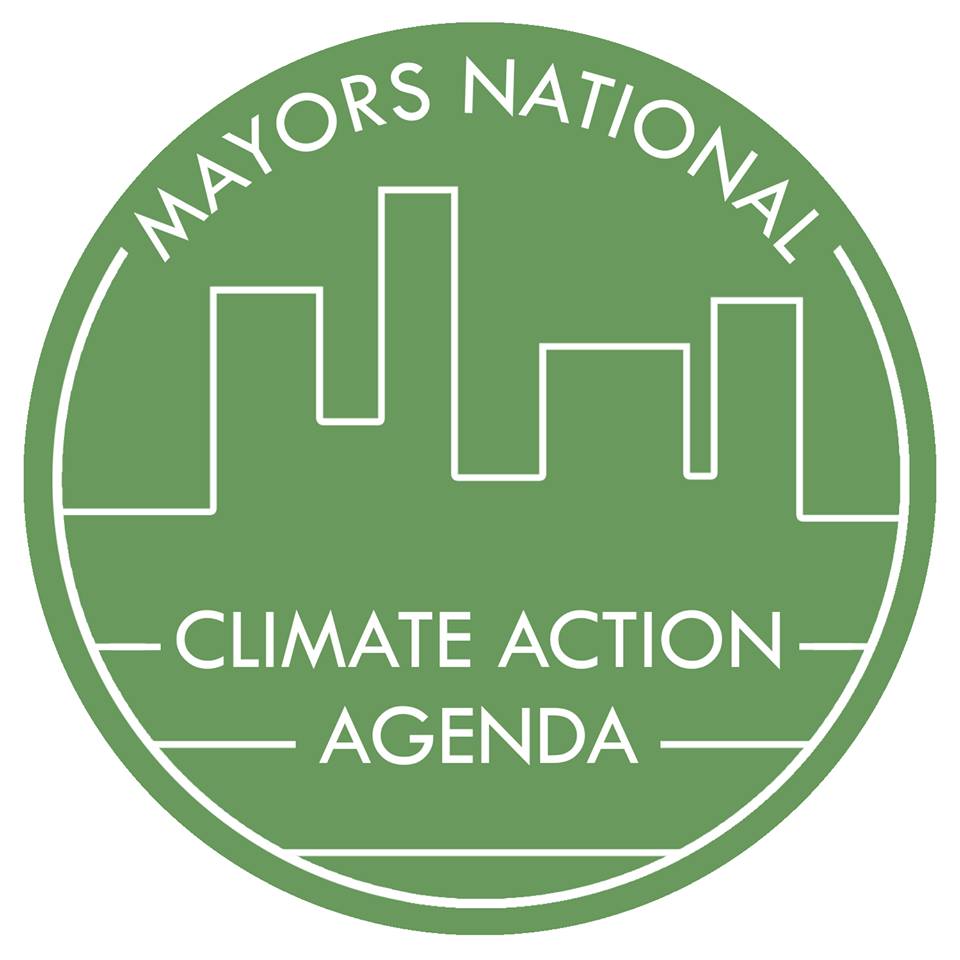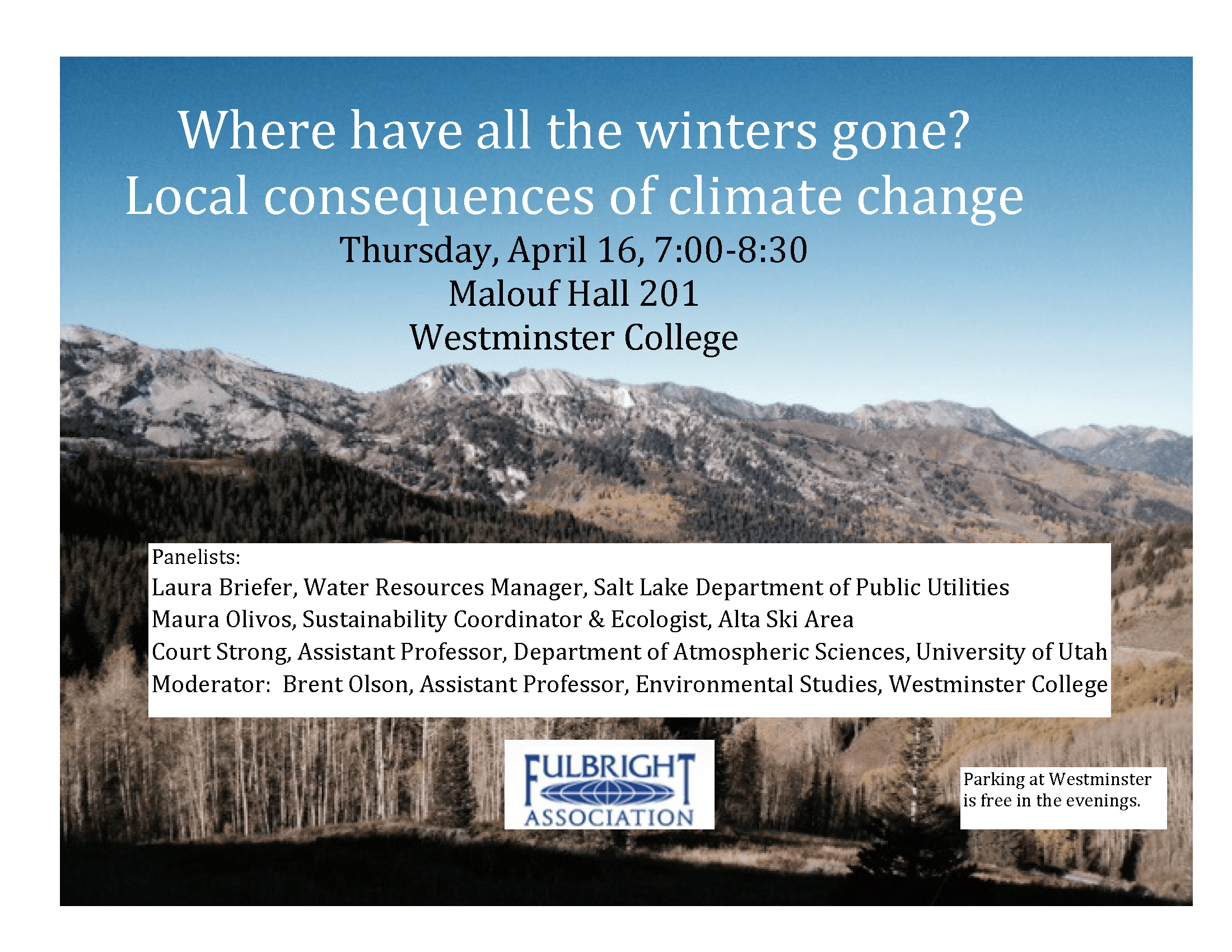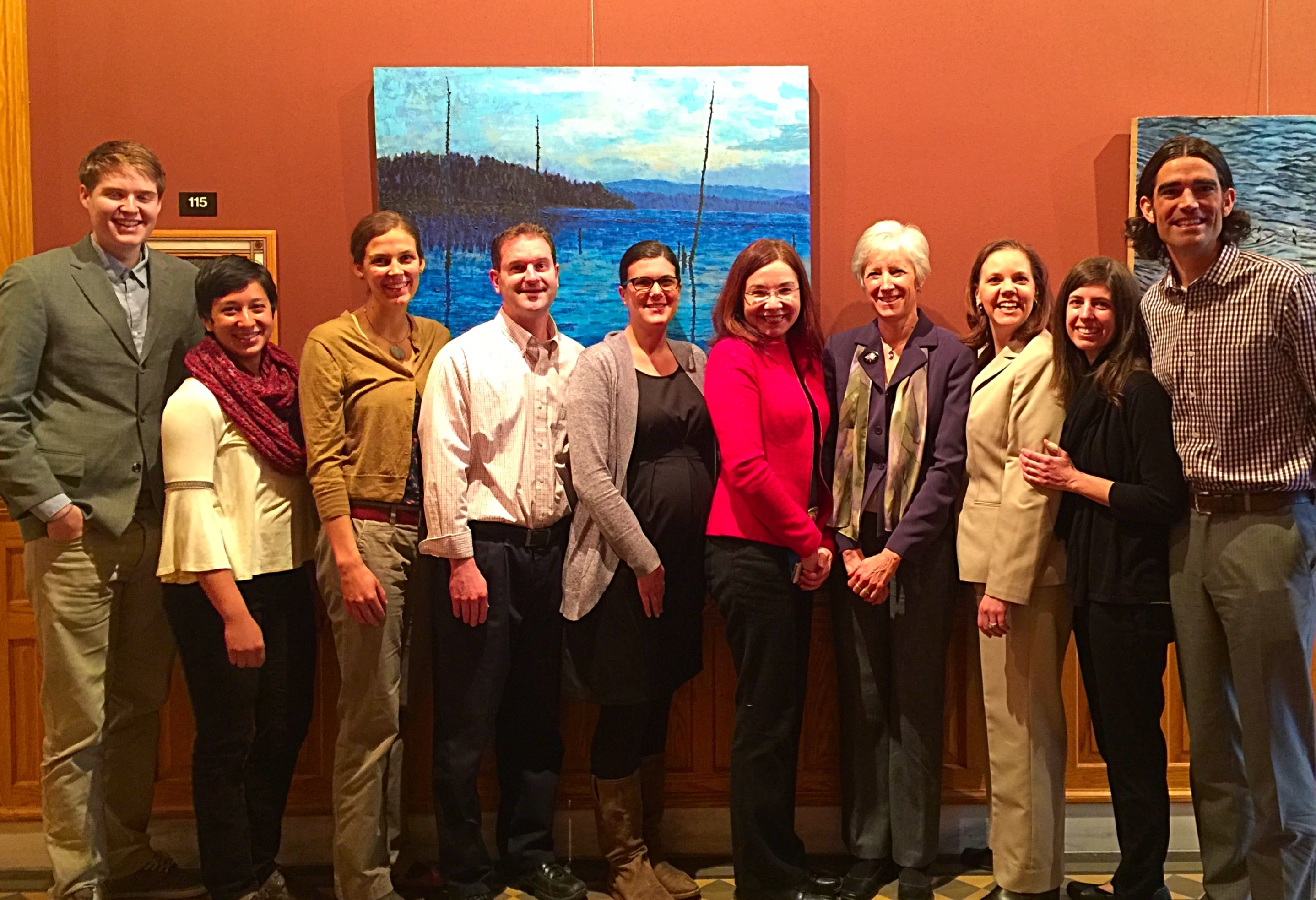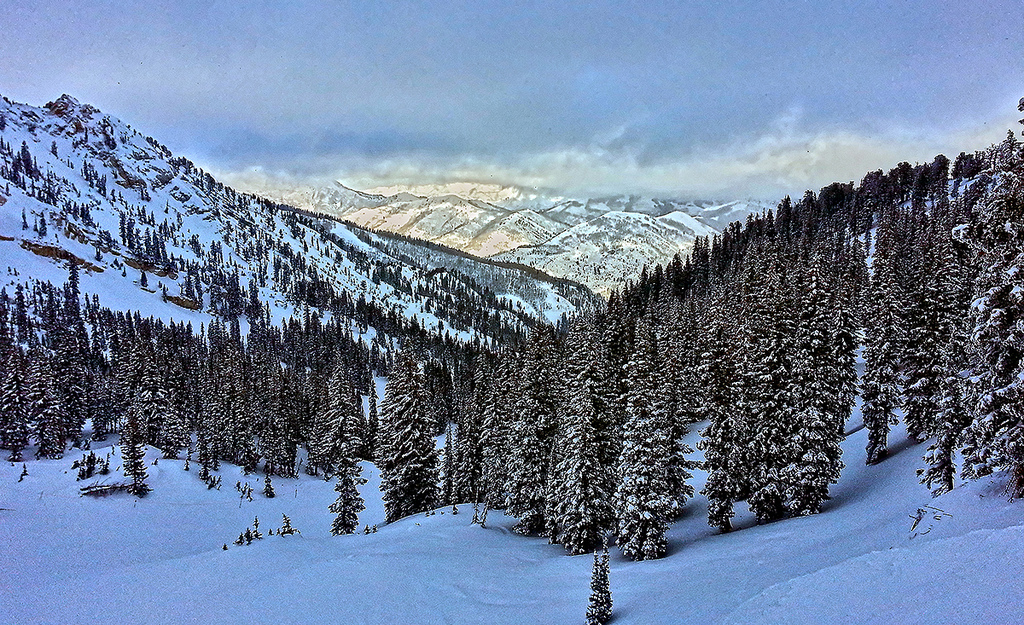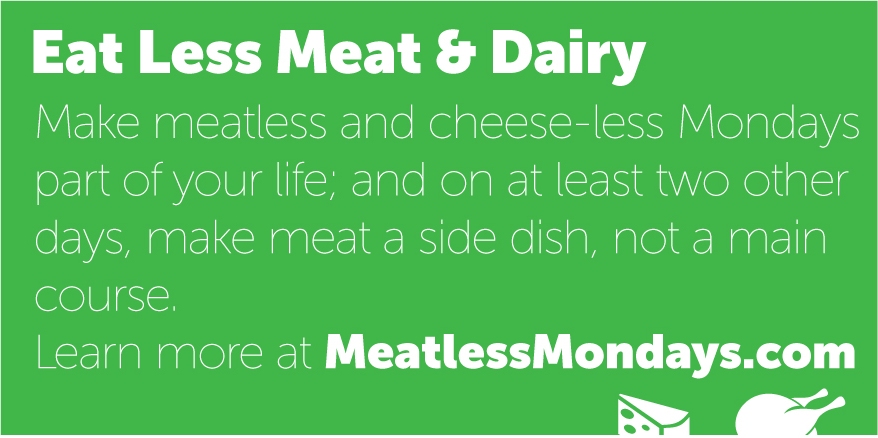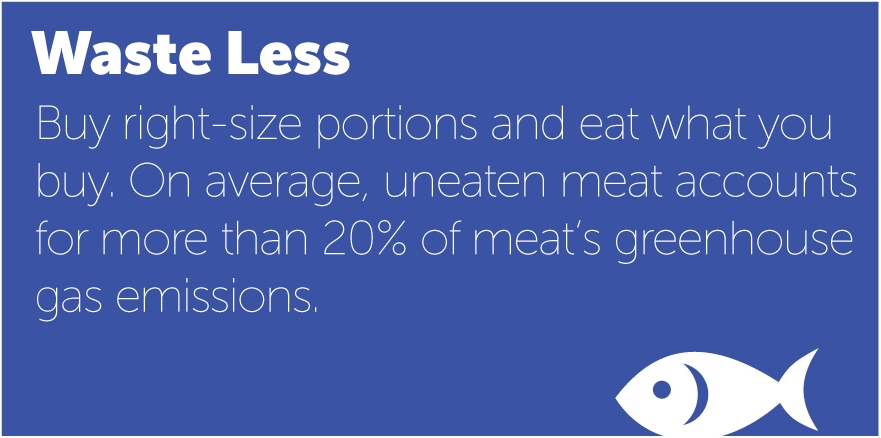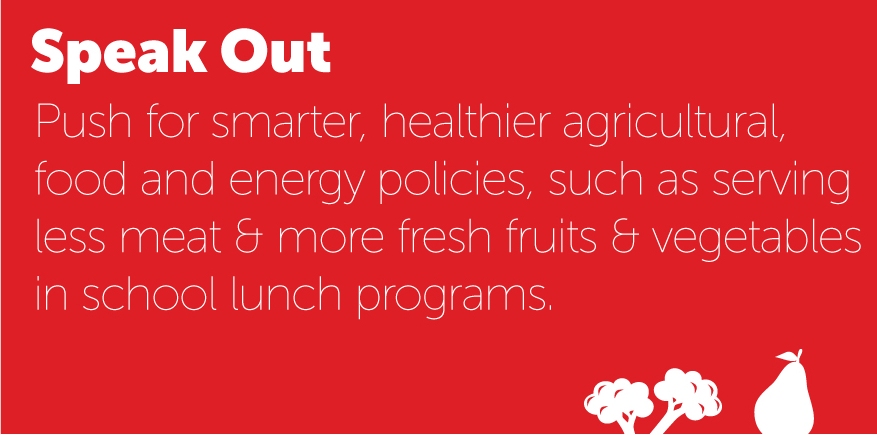An Idle Free City celebration took place at Liberty Park Tuesday morning. This media event included speeches by Mayor Becker, UCAIR Director, Ted Wilson, and Youth City students. High pollution levels are affecting air quality this summer. Join the Clear the Air Challenge, which starts today, and remember, turn your key, be idle free!
Tag Archives: climate change
The Climate 25–Diverse Voices on Climate Change
By Jessica Oglesby, SLCgreen Intern
In “The Climate 25” The Weather Channel brings together 25 diverse voices and perspectives on climate change. Interviews range from a CEO of a Fortune 100 company to a US Army General to a Syrian refugee. Through these interviews the series explores the interconnections between climate change, security, energy, and peace.
Some may be surprised to encounter so many conservative voices in this series, like Christine Todd Whitman (former New Jersey Governor and EPA administrator), former congressmen Bob Inglis, and President George H.W Bush’s EPA chief, William Reilly, all of whom acknowledge climate change and talk about their own perspectives. Inglis believes that the republican orthodoxy is changing, and that they have got to start looking at market solutions like a carbon tax. Former New Jersey governor Whitman gripes that “the way the republican party is addressing the issue of climate change is both frustrating and puzzling.” She explains that the republican party has a long history of environmental action — like Nixon establishing the EPA — and that conservation is conservative.
National and global security are big topics that many of the 25 speakers touch on, including the four military members that were interviewed. Retired General Charles Jacoby explains that while climate change has become politicized, his years as a soldier have trained him to evaluate situations based on harsh realities, thus he recognizes the threat that climate change poses. He explains the military’s grave concern over the growing impacts of extreme weather, and competition over natural resources, including energy and clean water. For this 4-star general, and distinguished combat veteran, “the issue of climate change is always foremost in our minds.”
Henry Paulson, the former Secretary of Treasury (under Pres.Bush), believes that “climate change poses a massive threat to the world”, and that to do nothing about climate change would be “radical risk taking.” He believes that this is the greatest economic risk the US has ever faced. George Luber of the CDC sees other great risks of climate change when it comes to human health. He says that heat waves kill more people every year than all other extreme weather combined, and climate change has already resulted in more intense and frequent heat waves. Moreover, changes in climate will result in increased spread of diseases like Malaria and Lyme’s disease.
Other prominent voices in the series include: New York Times columnist Thomas Friedman, former CIA director James Woolsey, former deputy Undersecretary of Defense Sherri Goodman, Bangladeshi General Major Muniruzzaman, and special advisor to President Obama, Dr.John Holdren. Less prominent, but equally important voices include: community leaders in Uganda and Papua New Guinea, a Global Crop Diversity Trust special advisor, a WWF climate change policy expert, and the CEOs of Energy Innovation and Care USA.
Together the 25 voices form a refreshingly diverse picture of how urgent the issue of climate change is and how wide-reaching its impacts are. What do all 25 of the smartest voices on climate, security, energy and peace have to say about climate change? Watch the rest of this fresh video series to find out!
Top 3 Favorite Interviews:
General Jacoby <<http://weather.climate25.com/project/general-charles-h-jacoby-ret/>>
Heidi Cullen <<http://weather.climate25.com/project/heidi-cullen/>>
Henry Paulson <<http://weather.climate25.com/project/henry-paulson/>>
Watch all of the interviews here!
Mayor Becker Joins Mayors’ National Climate Action Agenda
By SLCgreen Intern Jenny Spaulding
Mayor Becker has joined the Mayors’ National Climate Action Agenda, showing his support for national climate change action. The MNCAA is an organization of mayors that are asking President Obama to “fight for the strongest possible climate agreement” at the UN Climate Conference in Paris in December.
Many initiatives in Salt Lake City reduce local environmental impact, however the Mayor recognizes the importance of federal action. The MNCAA released a letter to the president stating that “The United States can and should be the leader in the transition to a clean energy economy.”
Salt Lake City is now among the twenty-six cities represented by the coalition. Mayor Becker announced that “Salt Lake City is proud to be joining the MNCAA in this important call for action.”
Idle Free Signs
New #IdleFree signs are going up around the city. Do you know of a location that could use a sign? To suggest sign locations or to learn more, click here.
Help to make your workplace or child’s after school/summer program idle free! Contact Olivia Juarez at 801-535-7761 or Olivia.Juarez@slcgov.com for more information or to request a FREE sign.
Check out these great photos from businesses around town that have put up new signs:
Thanks to UCAIR for your generous support of an Idle Free City.
“Your Utah, Your Future” Survey
How do you envision the future of Utah? By 2050, our population will nearly double, and Utah will add an estimated 2.5 million residents. Will we have enough water to drink? Will our air be clean? How will we educate twice as many students? Will our economy remain strong? What kind of future will we leave for our children and grandchildren?
Envision Utah has created a survey called “Your Utah, Your Future” commissioned by Governor Herbert. The survey gives five scenarios for the future of Utah. Each scenario includes 11 topics affected by our population growth. In the survey you select the choices you want to make in each topic area and then choose an overall scenario for Utah in 2050.
The survey will close on May 31, and at over 31,000 recorded responses, it is already the single largest community visioning effort ever undertaken in the US. The goal is 50,000 participants. Take the survey!
Please consider sharing it with your employees and coworkers, family and friends, and encourage them to take it, also.
Additionally, over 300 schools have registered across the state. You can earn money for your local schools- $1 for every response collected!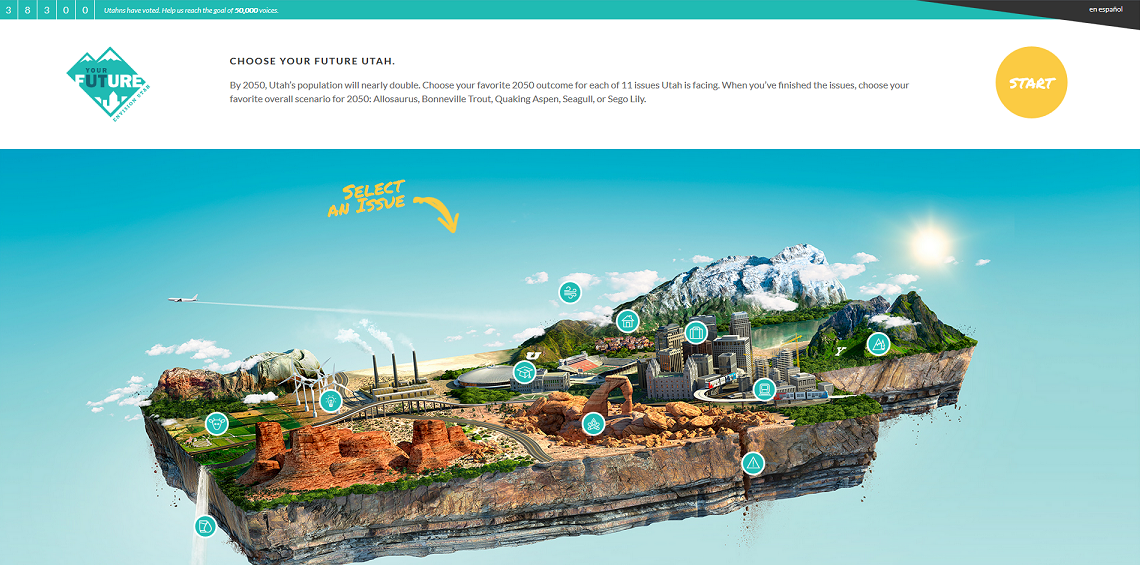
Mayor Becker Takes Action to Protect City Water Supply in Face of Climate Change Impacts
SALT LAKE CITY – Mayor Ralph Becker is working to protect Salt Lake City’s water supply in the face of another year of below average snow levels and spring run-off for Salt Lake City by declaring a Stage 1 Advisory in accordance with the Salt Lake City Water Shortage Contingency Plan. A Stage 1 Advisory calls for water customers to be watchful in regards to water use by avoiding overwatering and water waste.
The Salt Lake City Public Utilities Department is closely monitoring water supply levels and demand patterns to determine if further declarations are warranted. While the City’s current overall water supply is about 90 percent of normal, stream flows are very low, prompting the Stage 1 Advisory.
“This careful water management approach is part of our overall efforts to adapt to, and mitigate, the impacts of climate change that are already upon us,” said Mayor Becker. “Conservation, efficiency and sustainability guide how we approach all our goals for the City and I hope residents will join us in this effort.”
“Unfortunately, Salt Lake City is not immune to the realities of the climate change crisis and our recent below average snow fall is a clear sign of that. We are doing everything we can to address this problem for the short and long term.”
Mayor Becker has been actively working to address climate change at both the local and national level for many years. In addition to implementing a wide array of cutting-edge sustainability practices in Salt Lake City, Mayor Becker also served on the White House Climate Change Task Force which developed recommendations for the federal government on mitigating the damage caused by climate change in local communities like Salt Lake City.
“Last year, we were able to carry over a portion of our water allocation and save it in our reservoirs in the event of another year of below average snowpack,” said Salt Lake City Public Utilities Director Jeff Niermeyer. “This year’s snow levels mean that it is important to maintain that goal of reserving water for future need, should this pattern of low snow fall and runoff continue into next year.”
The Water Shortage Contingency Plan outlines five water shortage stages triggered by water supply levels, stream flows, and water demand. It also provides recommendations for actions within each stage aimed at reducing water demand to levels that reflect current supply and future water needs.
Public Utilities offers these simple recommendations for using less water:
- Adjust sprinkler controllers to reflect the season and weather
- Check sprinkler systems for broken or misaligned spray heads
- Check indoor faucets and fixtures for leaks and repair promptly
- Sign up for a free sprinkler check by calling 1-877-728-3420
- Visit http://slcgardenwise.com/ for water-saving tips and landscape information
For more information on how to reduce water use or to view the Water Shortage Contingency Plan, visit www.slcgov.com/waterconservation or contact Stephanie Duer, Water Conservation Manager at 801-483-6860 or stephanie.duer@slcgov.com.
Where have all the winters gone? Local consequences of climate change panel discussion
Where have all the winters gone? Local consequences of climate change
Thursday, April 16 from 7-8:30 p.m.
Malouf Hall 201, Westminster College
Panelists:
- Laura Briefer, Water Resources Manager, Salt Lake City Department of Public Utilities
- Maura Olivos, Sustainability Coordinator & Ecologist, Alta Ski Area
- Court Strong, Assistant Professor, Department of Atmospheric Sciences, University of Utah
- Moderator: Brent Olson, Assistant Professor, Environmental Studies, Westminster College
SLCgreen Kicks Off Katharine Hayhoe’s Week in Utah
The Salt Lake City Green team was honored to meet with Katharine Hayhoe, renowned climate scientist, communicator and educator, to kick off her week in Utah. We had a fascinating discussion about Salt Lake City, Utah and climate change, and explored the unique opportunities in our community to move forward on climate action.
Dr. Hayhoe (@KHayhoe) will be in Utah much of the week speaking about faith, science and climate action.
Monday, March 23:
- RadioWest: A Climate for Change (11 a.m.)
- Faith, Science and Climate Action — 7 p.m. at First Presbyterian Church (12 C Street)
Facebook event (RSVP)
Tuesday, March 24:
- Logan LDS Tabernacle (50 N Main Street) — 5 p.m.
Thursday, March 26:
The Future of the Central Wasatch Mountains Comments Due March 16th!
Clean water, open space, and the beauty of nature—the qualities valued most in the Central Wasatch.
This valuable and pristine natural resource is facing pressure from increasing population and visitation, sprawling development, and changing climate. On peak days, the Central Wasatch supports 50,000+ visitors. Annually, there are 5.7 million visitors—this is more than the annual number of visitors to the Grand Canyon and nearly twice the number of annual visitors to Zion National Park! Mountain Accord was established as a collaborative effort to make critical decisions and implement solutions to preserve the Central Wasatch and ensure long-term vitality for future generations.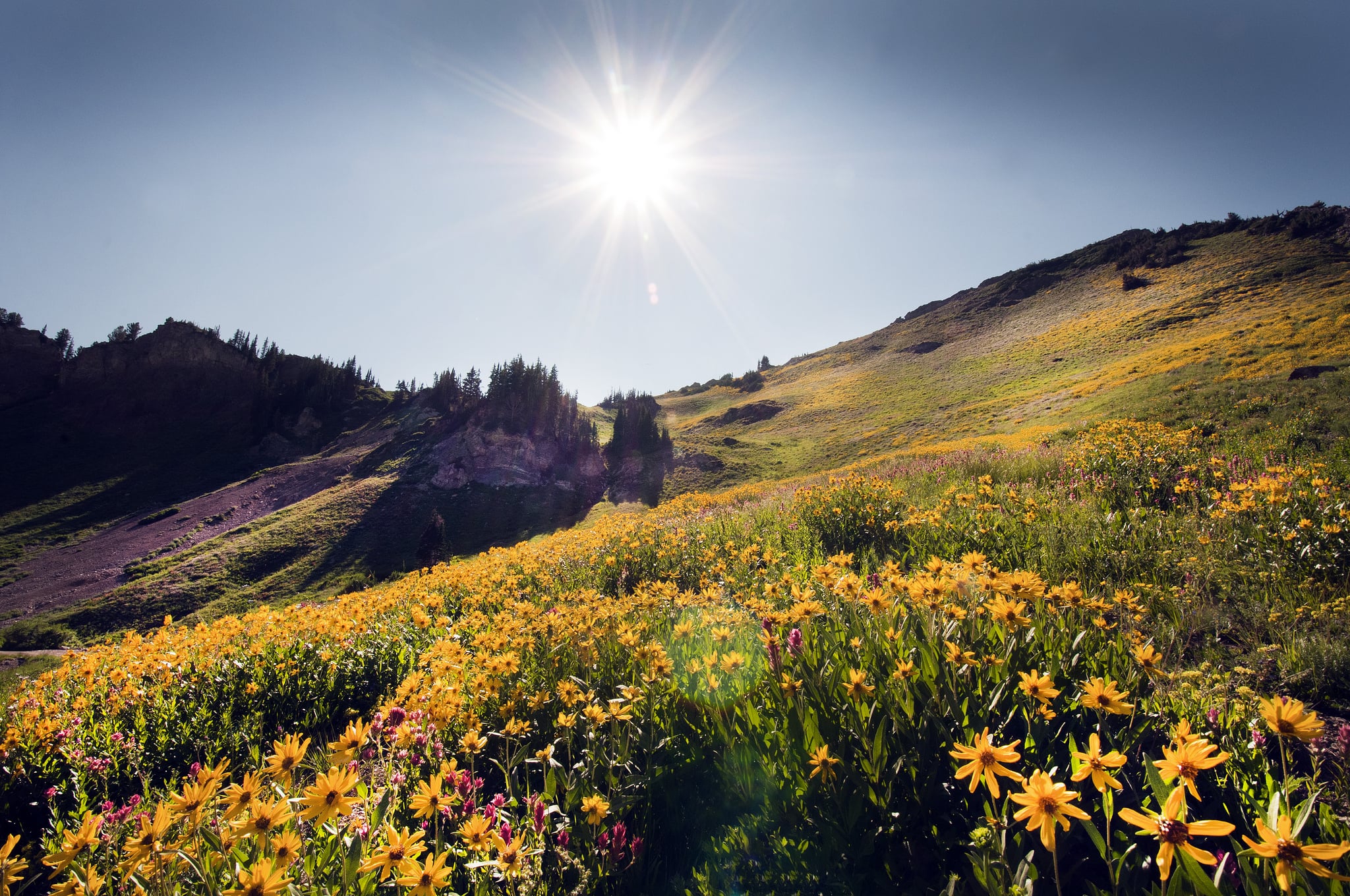
Here are some of their ideas:
- Secure protections on federal lands to provide permanent and predictable management, and work with ski areas to place lands into public ownership.
- Broaden watershed protections.
- Protect key wildlife corridors
- Connect the regional trail network for recreation
- Generate sustainable economic growth to reinvest in the Central Wasatch
- Expand transit services to potentially include:
- Mountain Light Rail service in Little Cottonwood Canyon and possibly full corridor service all the way to Kimball Junction. This would be made possible by one tunnel between Little Cottonwood and Big Cottonwood and another tunnel (or aerial transportation) between Big Cottonwood and Park City.
- Millcreek shuttle service
- Year-round Big Cottonwood bus service
Over the last year, Mountain Accord has worked to develop goals and define an “ideal” future for each system: environment, recreation, economy, and transportation. Their plans are summarized in a blueprint that is open for public review and comment until March 16. The blueprint contains several links to more detailed documents. Consider reviewing these documents for additional information and to develop a comprehensive response.
Visit: mountainaccord.com/get-involved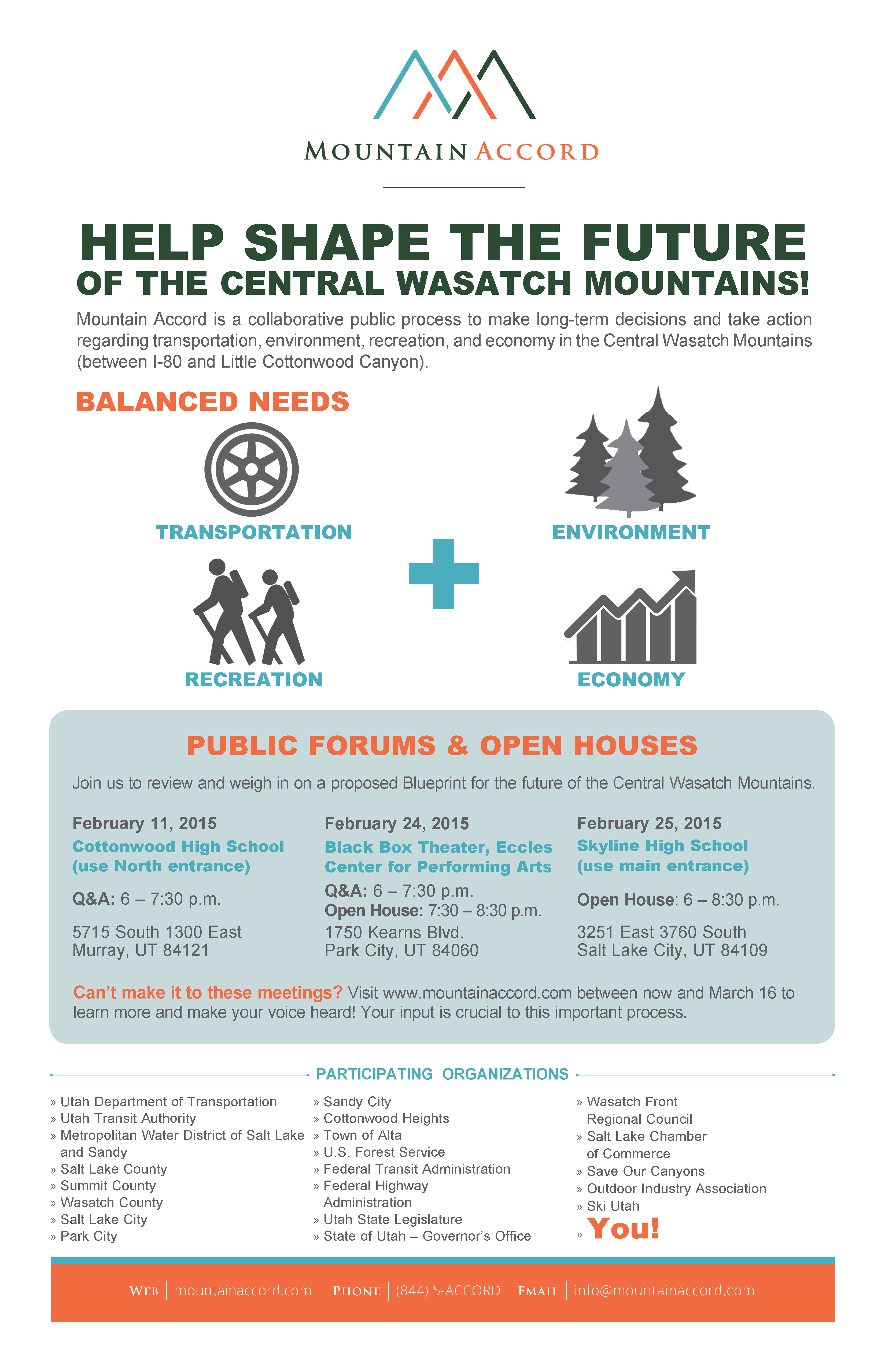
Comments may be emailed to comment@mountainaccord.com or mailed to:
Mountain Accord
375 West 200 South, Ste. 275
Salt Lake City, UT 84101
Please take the time to share this with others. It is the future of the Central Wasatch!
Dining with Discretion: Food Choices Matter
Last week, SLCgreen’s Bridget Stuchly and Tyler Poulson unveiled a compelling presentation at the Intermountain Sustainability Summit to a packed house. Dining with Discretion: Food Choices Matter outlines how personal choices about what and how we eat impact our environment and can either contribute to, or help alleviate, climate change.
The Presentation
If you missed it, you can scroll through their presentation slides.
[slideshare id=45617624&w=595&h=485&style=border: 1px solid #CCC; border-width: 1px; margin-bottom: 5px; max-width: 100%;&sc=no]
Take Action!
Long story short, there are some very real steps you can take in your everyday eating habits that will have a positive impact on the environment:
- Eat less meat & dairy
- Eat more plants
- Cook smart
- Waste less
- Speak out

